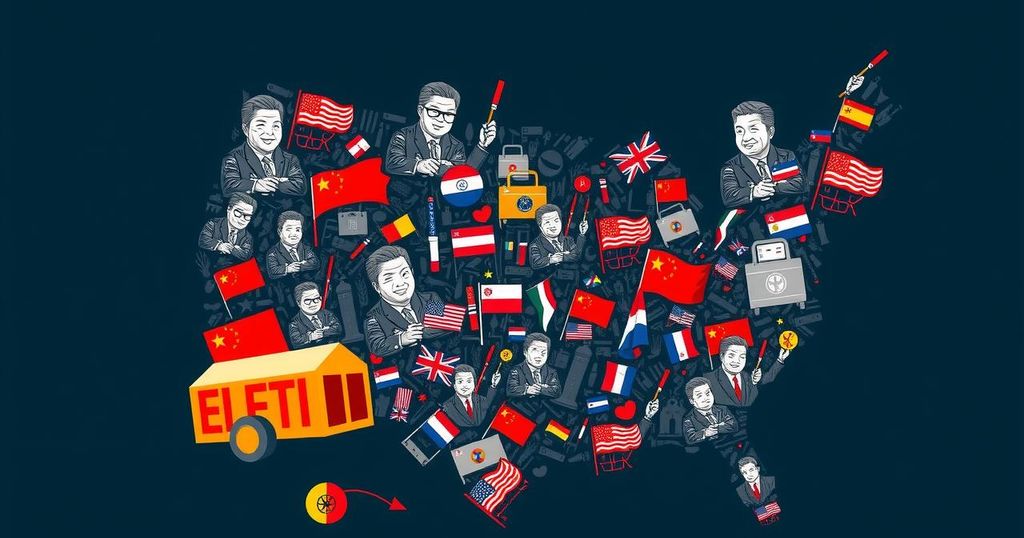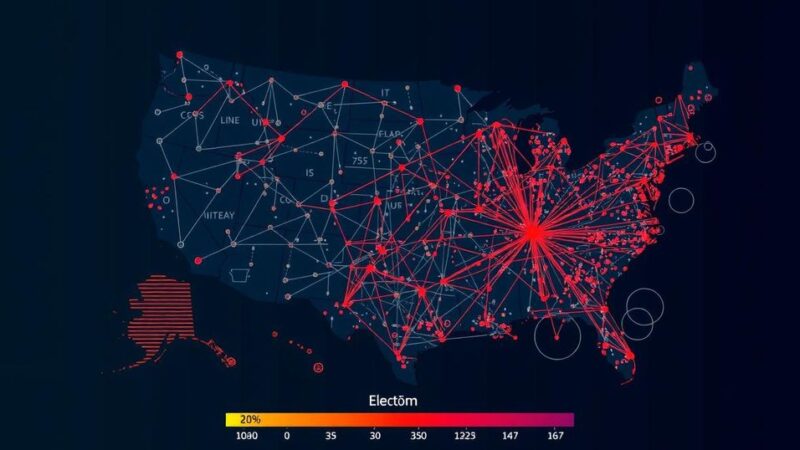The article discusses the impact of Chinese-produced election merchandise flooding the U.S. market. It highlights how this influx affects American manufacturers, who cannot compete with the lower prices offered by Chinese goods. Various industry leaders express concerns over the implications of this trend, which contradicts candidates’ promises to bolster the U.S. economy and manufacturing.
As the United States presidential election approaches its conclusion, an increasing number of voters are displaying their allegiance to candidates through election-themed merchandise. However, many may be unaware that items such as the “Make America Great Again” Trump hats or the “Childless Cat Lady for Harris” T-shirts they don might have been produced in China. The United States e-commerce landscape has seen a surge in Chinese-made election goods, which, despite their lower price points, are placing significant strain on U.S. manufacturers. Ben Waxman, founder and co-owner of American Roots, a U.S. apparel company, articulated concerns regarding the influx of Chinese merchandise. He stated, “I think the amount of stuff on Amazon and Etsy that’s coming from China and other countries in cargo ships and unloaded on American shores is drastically impacting American manufacturers’, like myself, ability to compete and grow our own business. I think it’s dramatic.” Waxman’s U.S.-produced campaign T-shirts are priced around $15, while similar items on Chinese platforms such as Temu may sell for as low as $3. The disparity in costs raises questions about the viability of domestic production in the face of inexpensive imports. On platforms like Temu, tens of thousands of election-related items are available, frequently at a fraction of the price of official campaign products. For instance, a “Make America Great Again” hat might retail for under $4, whereas the official Trump campaign offers the same item for $40. Similarly, the Kamala Harris campaign’s merchandise contrasts sharply with Temu’s pricing. Industry representatives highlight the challenges posed by a loophole permitting Chinese goods valued under $800 to enter the United States without incurring import duties. Kim Glas, CEO of the National Council of Textile Organizations, pointed out, “abuse of the de minimis loophole is rampant,” and lamented the closure of numerous manufacturing operations within the last year and a half. The irony is palpable as presidential candidates vocalize their commitment to strengthening the U.S. economy while their supporters purchase products from China, undermining those very goals. Mitch Cahn, president of Unionwear, noted, “If someone is supporting a candidate because of that candidate’s economic policy and their position toward improving our economy and improving our environment and improving our labor conditions, and doing so by increasing the amount of domestic manufacturing, and then they’re supporting a candidate by buying a product that’s made in a country that stands for the opposite of that, they’re actually doing themselves and the candidate and the economy a disservice.” Furthermore, the current election cycle has seen slower sales for American-made campaign products, as campaigns do not enforce intellectual property rights tightly, allowing nearly anyone to produce campaign items. This lack of control arguably drives consumers toward cheaper, Chinese-made options since domestic manufacturing cannot compete on price alone. Reports have also emerged that even promotional items associated with Donald Trump, such as Bibles, have been produced in China, raising further concerns regarding the validity of “Made in the USA” claims in political merchandise. Despite the loss of manufacturing jobs, experts suggest that some U.S. businesses have tapped into Chinese supply chains to maintain competitiveness. Chris Tang, a business administration professor, argued, “While there are job losses in manufacturing, it creates opportunities for small businesses to import small quantities quickly…” He recommends that the U.S. focus on strengthening its sector for high-value products instead of competing on low-cost items like election merchandise.
The influx of Chinese-made merchandise into the U.S. market has raised significant concerns over its impact on domestic manufacturers—especially in the context of election season when campaign-related items flood e-commerce sites. Despite candidates’ pledges to bolster the U.S. economy and manufacturing, consumers often choose cheaper foreign goods. This discrepancy not only reflects broader trade policy issues but also highlights weaknesses in U.S. manufacturing competitiveness.
In conclusion, the significant presence of Chinese-made election merchandise in the U.S. market poses challenges for domestic manufacturers, who struggle to compete with the lower prices offered by foreign goods. The contrasting prices of items indicate deeper trade policy implications and raise questions regarding consumer support for candidates who advocate for domestic manufacturing. As U.S.-China trade relations continue to evolve, the need for a strategic approach toward fostering robust domestic production becomes increasingly clear.
Original Source: www.voanews.com






